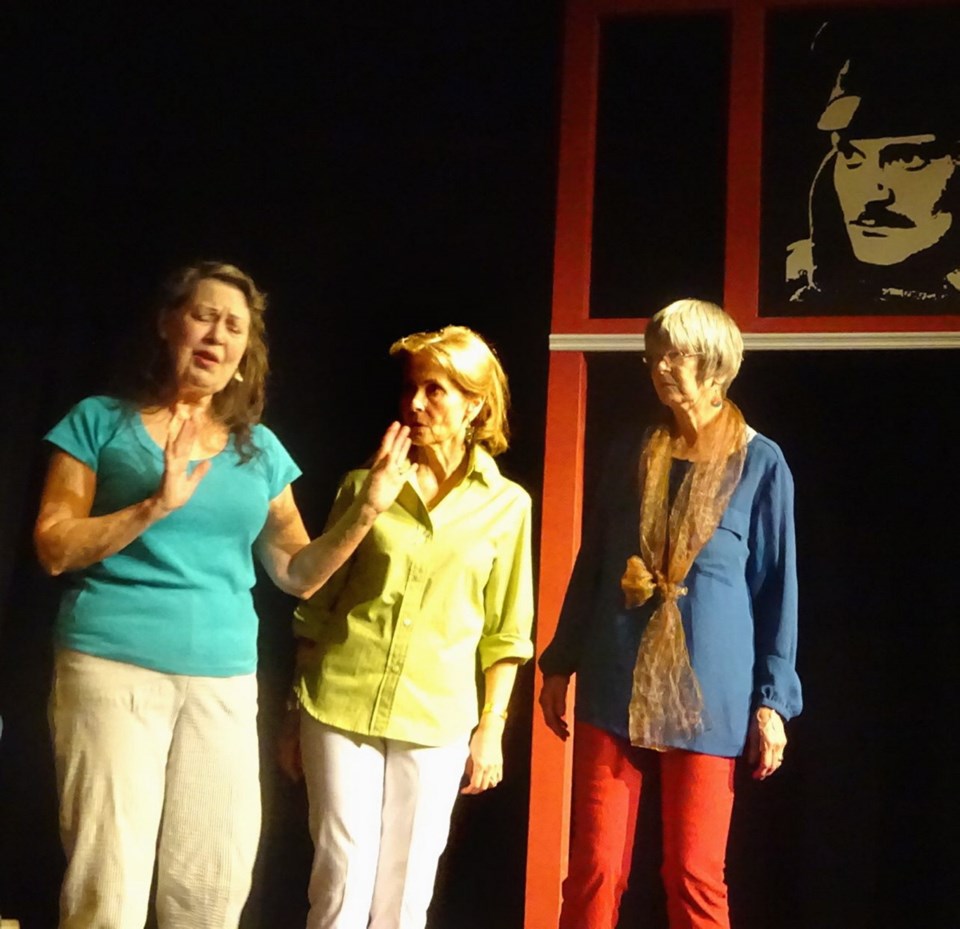In Rachel Wyatt’s new play, The Best of Friends, it’s revealed an elderly woman named Dorothy spent years penning letters to movie star Omar Sharif. Curiously, she never sent any of them.
It’s a passably interesting notion — why on Earth do we humans do such curious things? In The Best of Friends, which had its world première at Theatre Inconnu on Thursday, one might expect Omar to be a key ingredient in the play — especially so, given the set’s defining feature is three blown-up photographs of the actor.
Yet the story element never really goes anywhere. In many ways, the same might be said for this light, 90-minute drama with comic touches.
The Best of Friends is about three college pals — Dorothy, Kate and Elsie — who’ve known one another for half a century. As the women plan a charity dinner, they laugh, bicker, reminisce and, in one humorous scene, become totally inebriated.
Wyatt’s play is a rumination on friendship, love, mortality and the importance of embracing life’s absurdity. Unfortunately, the script is stymied by plot elements that seem unrealized, even arbitrary. And on this particular night, a cast of varying abilities struggled to flesh the characters into convincing, three-dimensional beings.
Dorothy (Geli Barlett) is the woman with the Omar Sharif fixation. She’s about to vacate her Toronto house, slated for demolition, and move into an apartment. Her elderly friends, Kate (Gloria Snider) and Elsie (Maureen Van Wyck), join her to organize a fundraising banquet with an Afghan theme. Elsie, a perfectionist country-club type who has purchased a large supply of goat meat, frets that her pals aren’t making a sufficient effort. Occasionally, she loses her temper and storms off. Such tantrums seem to pop out of nowhere, like unexpected explosions.
Each woman reminisces about her less-than-perfect love life. Dorothy’s late husband, a writer, appears to have drowned himself. Kate’s hubby escaped to Florida with another woman. Elsie’s marriage has endured for 45 years; however, she reveals her husband harbours a kinky secret that’s difficult for her to accept.
The notion of secrets is a central theme in The Best of Friends. Dorothy’s friends suspect she’s hiding a big one — and, at the end, it turns out that she was.
Wyatt’s plot can seem contrived and even arbitrary. The main narrative is the notion of the dinner — its planning, execution and aftermath. One might argue the concept has metaphorical significance in that it reflects on life’s absurdity and seeming futility (the event turns out to be problem-plagued; the goat meat was tough, the guests guzzled too much wine, ultimately no money was raised). Yet in The Best of Friends the dinner seems mostly a device for binding the story together. Oddly, we never experience the actual event, leaving the audience unsatisfied. It might have been fun, at least, to see the women struggling with the banquet-in-progress behind the scenes.
The notion of Dorothy spending years penning letters to Omar is never really explained or developed. Why does she do this? This lack may stem from the fact The Best of Friends is condensed from a longer work. The play was adapted from Wyatt’s novel Letters to Omar, which presumably explains her obsession.
One can understand why Theatre Inconnu would be interested in staging a new work by Wyatt. The 90-year-old playwright, who attended the opening, boasts an impressive resumé, having written many plays for CBC and BBC radio (locally her shows have been staged by the Belfry Theatre and the University of Victoria’s theatre department).
In our youth/social-media-obsessed age, it’s commendable to see a playwright tackle an unfashionable subject: the enduring and complex friendships of the silver-haired set. The Best of Friends was doubtlessly written with the best of intentions — and may appeal to some with a keen interest in the subject matter. It is, however, not among Wyatt’s best efforts.
The show continues at Theatre Inconnu to May 18. The company’s 2019 season includes Dead Man’s Cellphone by Sarah Ruhl (Sept. 24 to Oct. 12) and Crumble (Lay Me Down Justin Timberlake) by Sheila Callaghan (Nov. 26 to Dec. 14).



